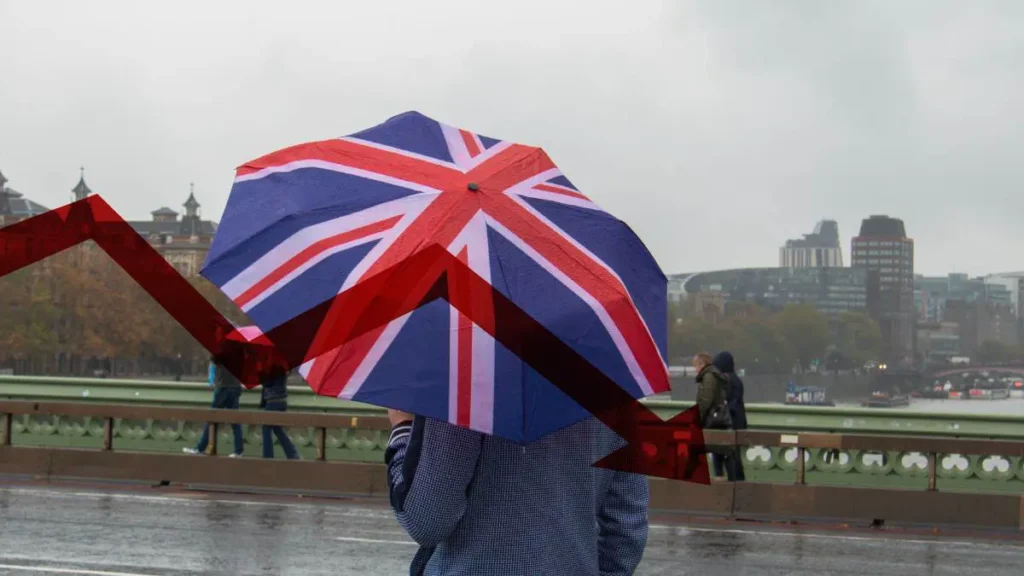On Friday, unmistakable signs of a UK economic recession showed up. That was just the day before, the Bank of England decided to stop its series of interest rate hikes.
There are concerns as the UK economy shrinks and it is clear from the halt on interest rate hikes.
The rate hikes successfully addressed inflation but negatively impacted businesses, contributing to the probability of the UK economic recession.
UK Economy Shrinks. Are BoE Rate Hikes the Reason?
The Bank of England, considering a business survey in its decision to maintain interest rates, found that companies faced a more challenging September than anticipated. This period was characterized by a rise in unemployment.
The initial assessment of the UK S&P Global Purchasing Managers’ Index (PMI) for the services sector dropped to its lowest point since the pandemic lockdown in January 2021. This level was even below all predictions in a Reuters poll of economists.
The news reinforces concerns about the UK economic recession.
UK Economic Recession Blooms as Concerns Intensify
Excluding the COVID-19 pandemic, the index hadn’t seen such a significant decline since the Global Financial Crisis. Moreover, its measure of employment experienced the most substantial drop on record, surpassing any downturn seen outside of the pandemic.
At 1105 GMT, the British pound was down approximately 0.4% against the US dollar, hovering just above its lowest point since March.
The British pound’s decline against the US dollar reflected investor uncertainties about how long the Bank of England could maintain current interest rates before considering cuts to avoid the UK economy recession.
While Purchasing Managers’ Index (PMI) indicators for the eurozone slightly improved, they still indicated an impending recession.
Additionally, a distinct survey conducted by the Confederation of British Industry (CBI) revealed a decline in factory output, with expectations of stagnation for the rest of 2023.
EY ITEM Club Adviser Foresees UK Economy ‘Bouncing Along the Bottom’
Martin Beck, the chief economic advisor to forecasters at the EY ITEM Club, mentioned that persisting with a narrative of “bouncing along the bottom” is probable for the near term.
Although the full effects of the Bank of England’s 14 consecutive rate hikes were not yet fully realized, and with a weakening job market, Martin Beck expressed optimism.
He noted that lower inflation and the perception that borrowing costs might have reached their peak indicated the likelihood of the economy avoiding a severe downturn.
Despite the subdued readings in business activity, there were indications of resilience among consumers.
Official data revealed a rebound in retail sales in August, partially recovering from a decline induced by rain in July. Additionally, a gauge of consumer confidence reached its highest level since January 2022.
Nevertheless, S&P Global indicated that its survey aligned with a potential decline in quarterly economic output by 0.4%.
PMI Survey Sparks Concerns of UK Economic Recession
Analysts, including Chris Williamson from S&P Global, emphasized that the disappointing PMI survey results heightened the chances of a probable UK economic recession.
Chris Williamson, chief business economist at S&P Global, remarked, “The disappointing PMI survey results for September indicate that a recession is looking increasingly likely in the UK.”
Contrary to this view, Samuel Tombs, an economist with Pantheon Macroeconomics, argued that wages were now surpassing inflation, household energy prices were expected to decrease, and consumer confidence levels were remaining stable.
Nevertheless, today’s report further heightens the likelihood that the Bank of England’s tightening cycle has come to an end,” he stated.
Read More: Goldman Sachs Sees Early Easing in India and Australia Following Fed’s Rate Cut Forecast
Federal Reserve Monetary Policy Shift Leads to Harmony on the Wall Street
Federal Reserve Interest Rate on Hold for Third Consecutive Month

